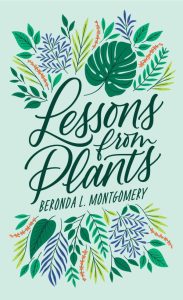For many years, the plant and botany communities have shared stories about plants during the month of December using the hashtag #AdventBotany. After a brief hiatus, it’s back, with a focus this year on #BotanyBooks #AdventBotany2023.
I chose to highlight a book I love, “Lessons from Plants” by Dr. Beronda Montgomery.

Dr. Montgomery’s book, which brilliantly encompasses lessons about plants as well as lessons from plants. The lessons about plants are familiar to many of us – plant seeds perceive light and temperature and use these cues to sprout at the right time; plants can live symbiotically with microbial partners in mutually beneficial arrangements, etc.
What makes this book special is that Dr. Montgomery then uses our understanding of plants as a source of insight and inspiration into human society. Two examples. In a natural ecosystem, plants grow synergistically, providing nutrients, shelter, or support to each other. Similarly, human societies benefit when diverse people share their talents and live synergistically.
And then from Dr. Montgomery’s research on the science of mentorship comes the idea of groundskeeping vs gatekeeping: When we are taking care of a houseplant, if it is not thriving we seek to identify and fill its needs. Does it need more water? Less water? More sun? What part of the environment is holding it back? However, we typically don’t offer such grace to our fellow humans. Struggles are seen as moral or intellectual failings; we assume that the fault is with the person rather than the environment. What a difference it would make if we were attentive to the environments in which individuals exist, and put our energy into defining people by their strengths, not their apparent “deficits”.
